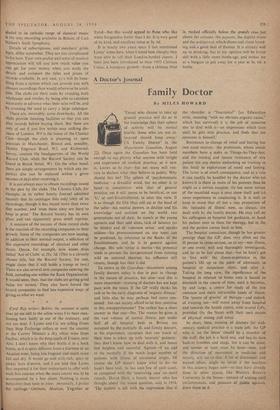A Doctor's Journal
Family Doctor
By MILES HOWARD
`Those who choose to take up general practice will do so in the knowledge that their sphere of activity will be mental health; those who are not in- terested should keep away.' ('A Family Doctor' in the Manchester Guardian, August 22). Once again the Guardian has been bold enough to say plainly what anyone with insight and experience of medical practice, as it now is, knows to be true—but not many will ven- ture to declare what they believe in public. Why should this be? The sphere of 'psychosomatic medicine'—a dreadful word, but no other is to hand—is coextensive with that of general practice, yet it still seems to be heretical, or not `Li,' or anti-Establishment, to utter this view. It is as though the Old Man still sat at the head of the table—his mental powers in decline and his knowledge and outlook on the world two generations out of date; he scowls at the young upstarts and their odd ideas, lack of balance (as he thinks) and of 'common sense,' and speaks seldom—his pronouncement on any topic can be predicted, by reference to the Books of the Establishment, and he is in general against change. HiS sole virtue is inertia—his presence tends to prevent the inexperienced from running wild on untested theories; his influence still counts, though less than it did.
To return to the Guardian—discontent among family doctors today is due in part to change in the nature of practice, but also—and this is more important—training of doctors has not kept pace with the times. If the GP really thinks his task to be the early diagnosis of 'organic disease.' and little else, he may perhaps feel more con- tented : but can society afford to let him continue in this misapprehension? The author has a short answer to that one—No. The reason he gives is the vast volume of mental illness; just under half of all hospital beds in Britain are occupied by the mentally ill, and family doctors, in his experience, complain that too much of their time is taken up with 'neurotic' patients: they don't know how to deal with it, and hence feel helpless and resentful. Agreed—if we add to the mentally ill the much larger number of patients with illness of emotional origin. Of course the GP doesn't know what to do—he hasn't been told; he has seen few of such cases, as compared with the 'interesting case' on ward rounds. David Hart, a family doctor who has thought about this vexed question, said in 1954, The student is left with the impression that if
the disorder is "functional" [an Edwardian term, meaning "with no obvious organic cause," which has survived] it is the job of someone else to deal with it—an impression which lasts until he gets into practice, and finds that the someone is himself.'
Resistance to change of mind and feeling has two main sources : the profession, whose senior members have a stake in Things-As-They-Are; and the natural and innate resistance of any patient (or any doctor embarking on training in this field) to exploration of mind and feeling. The latter is of small consequence, and as a rule it can readily be handled by the doctor who (a) knows it is there in more of his patients than he might as a novice imagine, (b) has some notion of the manifold ways it may show itself and (c) some experience in countering it. It is well to keep in mind that all but a tiny proportion of the 'episodes of illness' now, as always, are dealt with by the family,doctor. He may call on his colleagues in hospital for guidance, or hand his patient over to them for therapy, but in the end the patient comes back to him.
The hospital consultant, though he has greater prestige than the GP, does very often see the ill person in cross-section, so to say—one illness, Or one event; well and thoroughly investigated, and let us be fair about that—but he hasn't got to 'live with' the illness-experience in the patient's life up to the point of admission to hospital or outpatient clinic, and after it. Taking the long view, the significance of the hospital in relation to home care is bound to diminish in the course of time, until it becomes, by and large, a centre for study of the less common and more intractable kinds of illness. The 'centre of gravity' of therapy—and indeed, of training too—will move away from hospital and towards the health centre, with several GPs, provided (by the State) with their own means of physical testing and assay.
In short, then, training of doctors for mid- century medical practice is a team job; the GP who is 'on the beam' should be a member of the staff; the job is a hard one, and has its own built-in troubles and snags, but it can be done, and sooner or later must be done--time, and the direction of movement in medicine and society, will see to that. A lot of discontent, and wasted effort, might be saved if the teachers in this country began now—as they have already done in other places, like Western Reserve University in the States—instead of waiting until circumstances, and pressure of public opinion, drive them to it.














































 Previous page
Previous page